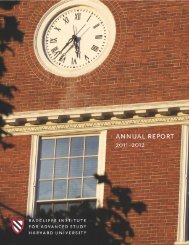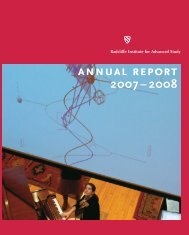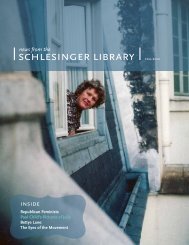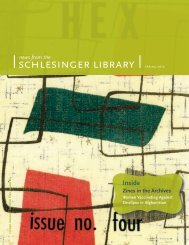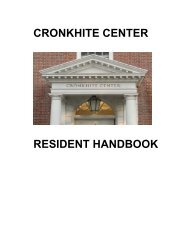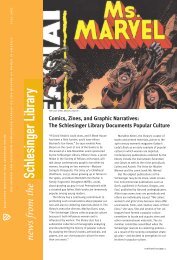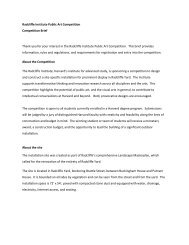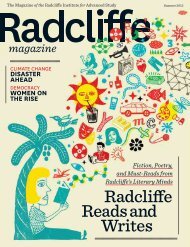Download PDF Version - Radcliffe Institute for Advanced Study
Download PDF Version - Radcliffe Institute for Advanced Study
Download PDF Version - Radcliffe Institute for Advanced Study
You also want an ePaper? Increase the reach of your titles
YUMPU automatically turns print PDFs into web optimized ePapers that Google loves.
From the Executive Dean<br />
A Memorable Year<br />
This February, I had the humbling experience of chairing the selection<br />
process <strong>for</strong> the 2006–2007 class of <strong>Radcliffe</strong> <strong>Institute</strong> fellows. With an<br />
acceptance rate of only 5 percent <strong>for</strong> the 2005–2006 class, the <strong>Radcliffe</strong> <strong>Institute</strong><br />
Fellowship Program has rapidly become one of the most competitive<br />
programs of its kind in the world, drawing 19 percent of its applicants from<br />
outside the United States and 34 percent from non-American citizens.<br />
Thanks to the generosity of our alumnae/i and the hard work of our staff, the<br />
<strong>Radcliffe</strong> <strong>Institute</strong> is on a firm financial footing, enabling us to support the<br />
work of our fellows and the growth of the Schlesinger Library while bringing<br />
us closer to our goal of fully endowing our activities.<br />
This has been an extraordinarily exciting year at <strong>Radcliffe</strong> but an<br />
unusual one. In January, five years after coming to Cambridge as dean of the<br />
<strong>Radcliffe</strong> <strong>Institute</strong>, Drew Gilpin Faust took a one-semester sabbatical to work<br />
on her book on the role of death in the Civil War. It is a testament to the success<br />
of her leadership in firmly establishing both the programs of the <strong>Institute</strong><br />
and the infrastructure to support them that we have not missed a beat in<br />
her absence.<br />
With an acceptance rate of only five percent <strong>for</strong> the 2005–2006 class, the <strong>Radcliffe</strong> <strong>Institute</strong><br />
Fellowship Program has rapidly become one of the most competitive programs of its kind in<br />
the world.<br />
fellowship program<br />
This year, <strong>Radcliffe</strong> welcomed fifty-one fellows to Cambridge, representing a<br />
wide range of disciplines and the creative arts. We had two research clusters<br />
of fellows: one cluster, composed of three economists and an American historian,<br />
worked on a multiyear project examining the career trajectory of<br />
women and men graduates from elite universities; the other cluster, composed<br />
of a linguist, a philosopher, and a computer scientist, examined the<br />
question of syntax. Each of these groups was accepted as a cluster to the fellowship<br />
program, and a third <strong>for</strong>med while in residence. Three fellows—<br />
one working on African American marriage in the nineteenth century, one<br />
2<br />
www.radcliffe.edu



